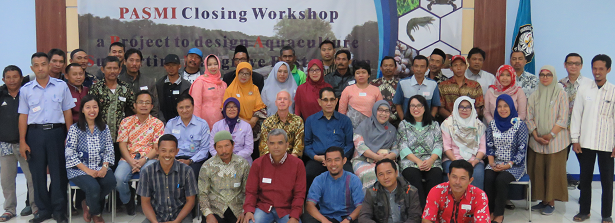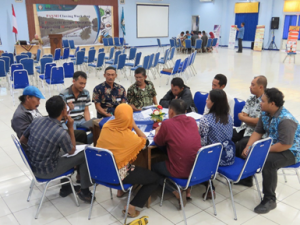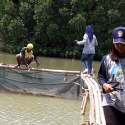PASMI project’s last stakeholder workshop

The Global Challenges Programme project “Sustainable aquaculture to support mangrove forest restoration in Indonesia (PASMI)” held its closing stakeholder workshop on September 19, 2019 at the Diponegoro University (UNDIP) in Indonesia, also to support the related project Demak-Building with Nature (BwN).
The workshop was attended by more than 20 farmers, three representatives from the provincial “Kementerian Kelautan dan Perikanan” (KKP, Ministry of Marine Affairs and Fisheries), two from Balai Besar Perikanan Budidaya Air Payau – Jepara (BBPBAP, Government research center for marine aquaculture), four from feed and processing industry, four from BwN partners and several lecturers.
The PASMI closing workshop aimed at hearing the feedback of its stakeholders. Major activities of the workshop included a debate on the results presented by three researchers, a review of the manuals for Integrated Multi-Trophic Aquaculture (IMTA) and Bleu Swimming Crab farming, and an inventory of further challenges and actions. The PASMI project coordinators presented their results of monitoring the field schools implemented by BwN.
Highlights of the workshop
 All participants highly appreciated the results of the experiments and tests on IMTA, which provides the byproducts, including waste, from one aquatic species as inputs (fertilizers, food) for another. Six farmers who practiced IMTA during one season gave positive feedback. Thus, the tested technologies can be spread further through farmer platforms, as a post field school activity with support of UNDIP staff. Although some farmers already started stocking Blue Swimming crab from by-catch in extensively managed ponds, the use of feed to sustainably fatten this crab is still quite challenging. The partners from BwN and industry appreciated the inventory of constraints to innovation, confirming that these are mainly lodged in conflicting government’s rules, regulations and implementations.
All participants highly appreciated the results of the experiments and tests on IMTA, which provides the byproducts, including waste, from one aquatic species as inputs (fertilizers, food) for another. Six farmers who practiced IMTA during one season gave positive feedback. Thus, the tested technologies can be spread further through farmer platforms, as a post field school activity with support of UNDIP staff. Although some farmers already started stocking Blue Swimming crab from by-catch in extensively managed ponds, the use of feed to sustainably fatten this crab is still quite challenging. The partners from BwN and industry appreciated the inventory of constraints to innovation, confirming that these are mainly lodged in conflicting government’s rules, regulations and implementations.
Based on the progress made by some farmers, PASMI, BwN and the seafood processor Bali Sustainable Seafood (BSS), fisheries alumni proposed to assist UNDIP and partners in developing a field school for Blue Swimming Crab culture. Central Java’s Department for Fisheries invited the PASMI team for a meeting and is considering to join the effort. The cost-efficiency of training traditional pond farmers through an aquaculture field school of 12 to 16 sessions is high (pay-back in one year). After only one season of BwN field school training, the traditional farmers more than tripled their shrimp yields and doubled their margins in a sustainable way.
In the coming months, the PASMI team will revise the manuals, prepare the final report for the donor and pursue publication of the results.






